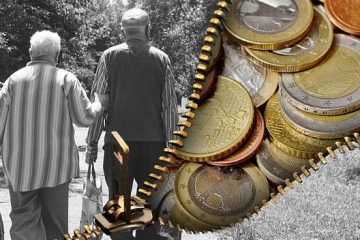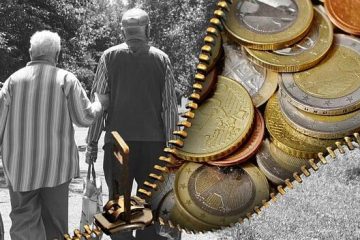When a loved one passes away, their legacy lives on in memories, but what about the financial security they worked hard to build? Exploring the complexities of pensions after death unveils a realm where practicality meets emotion. In this article, we delve into the delicate yet crucial topic of how pensions can offer a lifeline even after one’s journey on earth has ended. Join us as we navigate the nuances of posthumous financial planning and discover the peace of mind that a well-structured pension can bring to both the departed and their surviving loved ones.
Table of Contents
- Understanding Pension Beneficiaries and Eligibility Criteria
- Planning Ahead: Ensuring a Smooth Transition of Pension Benefits
- Maximizing Pension Benefits: Strategies for Optimal Financial Security
- Navigating Legal Aspects: Important Considerations When Dealing with Pension after Death
- Q&A
- To Wrap It Up


Understanding Pension Beneficiaries and Eligibility Criteria
In pension schemes, understanding who can be designated as beneficiaries and the criteria for eligibility is crucial. Beneficiaries are individuals who may receive benefits after the pension holder’s death. These beneficiaries can include spouses, children, or other dependents as specified by the pension plan. It’s essential to review and update beneficiaries regularly to ensure that benefits are distributed according to the pension holder’s wishes.
When determining eligibility criteria for pension benefits, factors such as the length of the pension holder’s service, age at retirement, and specific plan regulations come into play. Some pension plans may require a minimum number of years in service for full benefits to be granted, while others may have age restrictions for eligibility. Understanding these criteria is key to planning for one’s retirement and ensuring that beneficiaries are adequately provided for in the future.
| Beneficiaries | Spouses | Children | Dependents |
|---|---|---|---|
| Eligibility Criteria | Length of service | Age at retirement | Plan regulations |


Planning Ahead: Ensuring a Smooth Transition of Pension Benefits
Upon a loved one’s passing, the topic of pension benefits can bring both practical concerns and emotional sensitivity. Ensuring a smooth transition of pension benefits involves careful planning and understanding of the necessary steps that need to be taken during such a challenging time. **Here are some key considerations to help navigate this process effectively**:
Document Gathering: Collecting essential documents like the deceased’s will, pension statements, and beneficiary information is crucial. This paperwork will serve as a foundation for the next steps in the pension benefit transition process.
Consulting Professionals: Seeking guidance from financial advisors, legal experts, or pension administrators can provide valuable insights and ensure that all aspects of the pension benefits are handled correctly and efficiently.
In addition to emotional support, those involved in overseeing the pension benefits can benefit from practical tips on navigating the administrative tasks that follow. Here are some important steps to consider:
Notification: Informing the pension provider about the individual’s passing is vital to initiate the process of transferring or claiming the pension benefits.
Beneficiary Identification: Ensuring that beneficiaries are correctly identified and that relevant paperwork is completed accurately can prevent delays in receiving the entitled pension benefits.
| Important Documents | Organisation |
|---|---|
| Death Certificate | Top Priority |
| Will | Legal Assistance Needed |
| Pension Statements | Review with Advisor |
- Beneficiary Designation: Ensure your pension plan has clear beneficiary designations to specify who will receive benefits upon your death.
- Survivor Benefits: Research whether your pension plan offers survivor benefits for spouses or dependents to ensure ongoing financial support.
- Financial Planning: Work with a financial advisor to create a comprehensive plan that covers pension benefits and how they fit into your overall financial picture.
| Beneficiary Designation | Specify who will receive benefits |
| Survivor Benefits | Ensure ongoing financial support |
| Financial Planning | Create a comprehensive plan |
By proactively addressing these considerations, you can help safeguard your pension benefits and ensure that your loved ones are well taken care of in the event of your passing. Taking the time to plan ahead can make a significant difference in providing financial stability during challenging times. Consulting with professionals and staying informed about pension options can offer valuable insights for maximizing pension benefits both now and in the future.
Navigating Legal Aspects: Important Considerations When Dealing with Pension after Death
When navigating the legal landscape surrounding pensions after a loved one’s passing, there are crucial considerations to bear in mind. Firstly, understanding the beneficiary designation is paramount. Ensure that the designated beneficiaries are kept up to date to prevent any complications in the future. If no beneficiary is named, the pension may be subject to the terms outlined in the pension plan or even the probate process.
Another essential aspect to ponder is the tax implications associated with inherited pensions. Depending on the type of pension and the beneficiary’s relationship to the deceased, tax obligations can differ. Exploring the tax consequences beforehand can aid in making informed decisions regarding the inherited pension. Seeking advice from financial and legal professionals can provide clarity on navigating these complex matters seamlessly.
Q&A
Q&A: Understanding Pension After Death
Q: What happens to a pension after the death of the pension holder?
A: When a pension holder passes away, the fate of their pension depends on various factors, such as the type of pension plan and beneficiaries nominated.
Q: Can a spouse inherit the pension after the death of their partner?
A: In many cases, a spouse can inherit the pension after their partner’s death, providing financial support during challenging times.
Q: How can one ensure that their pension benefits their loved ones after they are gone?
A: It’s crucial to update beneficiary information regularly and understand the rules and options of the specific pension plan to ensure that loved ones benefit as intended.
Q: Are there any taxes involved when inheriting a pension after someone’s death?
A: Tax implications can vary based on the type of pension plan and the relationship between the deceased and the beneficiary. Consulting a financial advisor is advisable in such situations.
Q: What steps should be taken by beneficiaries to claim the pension after the death of the pension holder?
A: Beneficiaries should promptly notify the pension provider of the pension holder’s passing and provide the necessary documentation to initiate the pension claim process.
Q: How can individuals effectively plan for their pensions to support their loved ones after they are no longer around?
A: It’s essential to engage in detailed financial planning, including estate planning and regular reviews of pension arrangements, to ensure that loved ones are financially secure in the future.
Remember, navigating pension arrangements after a loved one’s passing can be complex. Seeking professional advice and staying informed about pension options are key aspects of securing a stable financial future for your beneficiaries.
To Wrap It Up
As we conclude our exploration of the topic of pensions after death, it becomes evident that planning for the future encompasses not only our own livelihood but also considerations for our loved ones beyond our time. The intricacies of posthumous financial arrangements can often seem daunting, yet with the right knowledge and foresight, we can pave the way for a more secure tomorrow. Whether it’s understanding beneficiaries, inheritance laws, or the various options available, taking proactive steps today can provide peace of mind for both ourselves and those we hold dear. Remember, while the topic may be sensitive, it’s crucial to approach it with informed decision-making and a sense of responsibility. Stay tuned for more insightful articles on financial planning and beyond. Thank you for joining us on this journey of knowledge and preparation.




0 Comments